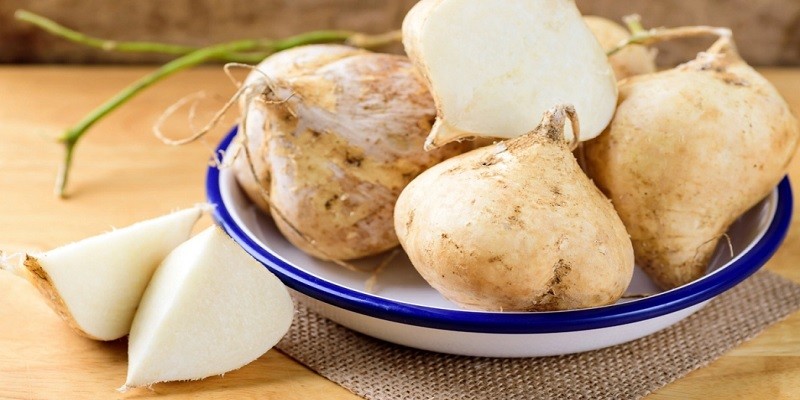Last Updated on May 29, 2024
Yes, you can eat jicama while pregnant. Jicama is a nutritious, low-calorie vegetable that provides essential vitamins, minerals, and fiber, making it a healthy addition to a pregnancy diet. However, it is crucial to consume only the root and avoid other parts of the plant, which are toxic.
Jicama, a root vegetable native to Mexico, is known for its crisp texture and slightly sweet flavor. It is often compared to a cross between a potato and an apple. Pregnant women may wonder if jicama is safe to include in their diet. This article explores the benefits, nutritional value, risks, and safe ways to consume jicama during pregnancy.
What is Jicama?
Jicama, also known as Mexican turnip or yam bean, is a starchy root vegetable with a thick brown skin and white, crunchy flesh. It is low in calories and high in fiber, making it a popular choice for those looking to maintain a healthy diet. Jicama can be eaten raw or cooked and is often used in salads, slaws, and stir-fries.
Nutritional Value of Jicama
| Nutritional Value | Details |
|---|---|
| Calories | 46 per cup (130 grams) |
| Carbohydrates | 11 grams |
| Fiber | 6 grams |
| Sugars | 2.2 grams |
| Protein | 0.9 grams |
| Vitamin C | 26 milligrams (40% of daily value) |
| Potassium | 195 milligrams |
| Other Nutrients | Folate, magnesium, iron, calcium, and antioxidants |
Risks of Eating Jicama During Pregnancy
| Risks | Details |
|---|---|
| Allergic Reactions | Rare, but can cause itching or digestive issues |
| Digestive Issues | High fiber content may cause gas or bloating if consumed in large amounts |
| Toxic Parts | Only the root is safe to eat; other parts contain rotenone, a toxic compound |
Safe Ways to Eat Jicama During Pregnancy
To safely enjoy jicama during pregnancy, always peel the skin and consume only the root. Jicama can be eaten raw, added to salads, or cooked in various dishes. It is a versatile vegetable that can be sliced, diced, or julienned. Pair it with other healthy foods like fruits, vegetables, and lean proteins for a balanced diet.
Alternatives to Jicama During Pregnancy
| Alternatives | Precautions |
|---|---|
| Carrots | Ensure they are thoroughly washed and peeled |
| Cucumbers | Wash thoroughly to remove any pesticides |
| Bell Peppers | Opt for organic to avoid pesticide exposure |
| Apples | Wash and peel to reduce pesticide residue |
| Water Chestnuts | Ensure they are cooked to avoid any potential bacteria |
Expert Tips
- Moderation is Key: “While jicama is nutritious, consume it in moderation to avoid digestive issues.”
- Peel Thoroughly: “Always peel jicama to remove the toxic skin before eating.”
- Pair with Protein: “Combine jicama with protein-rich foods to create a balanced meal.”
FAQs
Is jicama safe to eat raw during pregnancy?
Yes, jicama is safe to eat raw during pregnancy as long as it is peeled and washed thoroughly. It can be a crunchy and refreshing addition to salads and snacks.
Can jicama help with pregnancy-related constipation?
Yes, jicama is high in dietary fiber, which can help alleviate constipation, a common issue during pregnancy. Its fiber content promotes healthy digestion and regular bowel movements.
Are there any parts of the Jicama plant that should be avoided?
Yes, only the root of the jicama plant is safe to eat. The skin, leaves, stems, and seeds contain rotenone, a toxic compound that can be harmful if ingested.
How can I incorporate jicama into my pregnancy diet?
You can add jicama to salads, and slaws, or eat it raw with a sprinkle of lime juice and chili powder. It can also be cooked in stir-fries or soups for added crunch and nutrition.
What are the benefits of eating jicama during pregnancy?
Jicama provides essential nutrients like vitamin C, fiber, and potassium, which support immune function, digestion, and overall health. Its low-calorie content makes it a healthy snack option.
Conclusion
Jicama is a nutritious and safe vegetable to include in your pregnancy diet when consumed properly. Its high fiber content, essential vitamins, and minerals offer numerous health benefits. Always peel the skin and eat only the root to avoid any potential risks. Incorporating jicama into a balanced diet can contribute to a healthy pregnancy.

